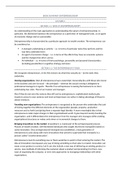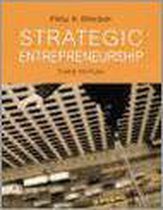BOOK SUMMARY ENTREPRENEURSHIP
LECTURE 1
SECTION 1.1: WHAT IS ENTREPRENEURSHIP?
An understanding of the main approaches to understanding the nature of entrepreneurship. In
particular, the distinction between the entrepreneur as a performer of managerial tasks, as an agent
of economic change and as a personality.
Entrepreneurship is characterized by a particular approach to wealth creation. The entrepreneur can
be considered as:
A manager undertaking an activity – i.e. in terms of particular tasks they perform and the
way they undertake them
An agent of economic change – i.e. in terms of the effects they have on economic systems
and the changes they drive; and as
An individual – i.e. in terms of their psychology, personality and personal characteristics
(including peculiarities in cognitive strategy and style)
SECTION 1.2: THE ENTREPRENEUR’S TASKS
We recognize entrepreneurs, in the first instant, by what they actually do – by the tasks they
undertake.
Owning organizations: (Not all entrepreneurs have ownership). Ownership lies with those who invest
in the business and own its stock – the principals – whereas the actual running is delegated to
professional managers or agents. Therefor if an entrepreneur is owning the business he or she is
undertaking two roles. That of an investor and manager.
Also if they do not own the venture they still can be entrepreneurs: sophisticated markets give
investors access to new ventures and most entrepreneurs are active in taking advantage of these to
attract investors.
Founding new organizations: The entrepreneur is recognized as the person who undertakes the task
of brining together the different elements of the organization (people, property, productive
resources and so forth) and giving them a separate legal identity. A more meaningful idea is that
entrepreneurs make major changes in their organizational world. It goes beyond merely founding the
organization, and it differentiates the entrepreneur from the manager who manages within existing
organizational structures or makes only minor or incremental changes to them.
Bringing innovations to the market: Innovation is a crucial part of the entrepreneurial process.
Process of wealth creation. Self-interested individuals who sought short-term monopolies based on
some innovation. Once entrepreneurial monopoly was established, a new generation of
entrepreneurs came along with more innovations that aimed to supersede that monopoly in a
process called “creative destruction”.
Entrepreneurs must do something new or there would be no point in their entering the market. The
idea of innovation encompasses any way of doing something so that value is created. Innovation can
mean a new product or service, but it can also include a new way of delivering an existing product or
service, new methods of informing the customer about a product and promoting it to them, new
ways of organizing the company, or even new approaches to managing relationships with other
organizations.
, The entrepreneurs task goes beyond simply inventing something new. It also includes bringing that
innovation to the marketplace and using it to deliver value to consumers.
Identification of market opportunity: An opportunity is a gap in a market where the potential exists
to do something better and thereby to create value. New opportunities exist all the time, but they do
not necessarily present themselves. If they are to be exploited, they must be actively sought out. Key
task identification of opportunities. An innovation (a new way of doing something) is an innovation
only if it meets with an opportunity (a demand for a new way of doing something)
The real value is created when that opportunity is exploited by something new which fills the market
gap.
Application of expertise: They have a special ability in deciding how to allocate scarce resources in
situations where information is limited. It is their expertise in doing this that makes entrepreneurs
valuable to investors.
Provision of leadership: Leadership is increasingly recognized as a critical part of managerial success.
Entrepreneurs can rarely drive their innovation to market on their own. They need the support of
other people, both from within their organizations and from people outside such as investors,
customers and suppliers. If all these people are to pull in the same direction, to be focused on the
task in hand and to be motivated, then they must be supported or directed. This task falls on the
shoulders of the entrepreneur, most of the times.
Leadership is an important factor in entrepreneurial success and it is often a skill that is exhibited
particularly well by the entrepreneur, but it is a general management skill rather than one which is
specific to the entrepreneur.
The entrepreneur as a manager: After all, the entrepreneur is a manager. If we do must draw a
distinction between an entrepreneur and an ordinary manager: it must be in terms of what the
entrepreneur manages, how they manage, their effectiveness and the effect they have as a manager,
not the particular tasks their undertake.
SECTION 1.3: THE ROLE OF AN ENTREPRENEUR
Entrepreneurs create new value. Three primary economic factors: the raw materials that nature
offers up, the physical and mental labor that people provide, and capital (money). All the products
(and services) bought ad sold in an economy are a mix of these three things. Value is created by
combining these three things in a way which satisfies human needs.
Some economists regard entrepreneurship as a fourth factor: innovation is simply finding new
combinations of economic factors.
Providing market efficiency: Here, efficient means that resources are distributed in an optimal way,
that is the satisfaction that people can (collectively) gain from them is maximized. An economic
system can only reach this state if there is competition among different suppliers. Entrepreneurs
provide that efficiency.
Accepting risk: Lack of knowledge about the future, we call uncertainty. If we know the likelihood
(probability) of various possibilities then uncertainty becomes risk. Primary function of the
entrepreneur is to accept risk on behalf of other people. There is, in this view, a market for risk.
Entrepreneurs provide a service by taking this risk off people’s hands. They are willing to buy it.
(People are risk averse)






